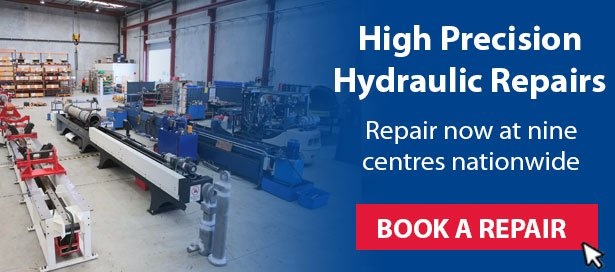
Berendsen’s hydraulic cylinder repair centres around the country return hundreds of cylinders to service every month. As a result, there’s nothing they haven’t seen when it comes to hydraulic cylinder failures. To help you understand how and why cylinders fail, here are the top things that put these hard working actuators out of action. So you can watch out for them.
1. Leaking Seals
Made of soft materials, seals are the weakest point of any cylinder and failure is common for a variety of reasons. Heat causes them to break down, they can become damaged by scratched piston rods, or fractured by pressure spikes. They’re also subject to chemical erosion and/or wear from dirt and abrasives. It’s easy to spot a failed seal. The rod runs wet, with a collar of oil and there may be a dirt build-up around the gland as dust and debris settle on the damp area. You may also discover deposits of fluid below the cylinder or machine.
2. Fluid Contamination
The fluid that operates your cylinder is always at risk of becoming contaminated by debris and abrasive particles that can wreak havoc on almost all components. It can block ports, damage the surface finish of cylinder rods, cause accelerated seal wear, and get between pistons and running surfaces. Hydraulic fluid naturally degrades over time, but poor machine condition and things like faulty wiper seals can increase the odds of fluid contamination.
3. Scored Piston Rods
This is a common one. Piston rod condition is extremely important for the life of the hydraulic seal, so it’s important to keep them in good order. However, this is not always easy especially for cylinders that operate in extreme environments where objects can come into contact with the chrome surface of the piston rod and form deep scratches with very sharp edges. As the cylinder extends and retracts, the seal passes over these and quickly become sliced and marred. A seal leak is inevitable and follows very quickly. Luckily, damaged piston rods can be re-plated to restore the surface finish.
4. Bent Piston Rods
Bent rods occur when the rod diameter and material strength is not sufficient to withstand the loads that are placed upon them. When this happens, components such as pistons and seals become misaligned and lose the ability to contain hydraulic fluid pressure. A hydraulic fluid leak is the inevitable result.
5. Ballooned Barrel Tubes
Ballooning of cylinder barrel tubes is usually caused by insufficient wall thickness and/or material strength for the cylinder’s operating pressure. Ballooning occurs when the cylinder becomes deformed and the correct tolerance between the piston seal and tube wall is lost, allowing high-pressure fluid to bypasses the seal. This high fluid velocity can result in erosion of the seal including localised heating caused by the pressure drop across the piston thus resulting in reduced seal life.
6. Cylinder Bore Scoring
Cylinder bore scoring appears as heavy scuffs or deep gouges upon the interior of the bore walls. This is usually most apparent at the mouth of the barrel where the piston is at the fully extended position, with less support leading to increased forces and friction. Cylinder bore scoring is common in long stroke cylinders. Cylinders that are mounted improperly or do not accommodate for some changes in alignment may also increase the occurrence of cylinder scoring. In certain applications the cylinder is exposed to increased side-load forces, which can cause the rod to become cocked in the barrel, leading to cylinder scoring.
7. Split Welds
Split welds are a catastrophic failure signified by cracks or separation of welded surfaces such as mounting points. A split weld is always a serious concern and if untreated could have disastrous consequences that may lead to injury to personnel or damage to equipment. Split welds are a usually a sign of excessive or abnormal force applied to the cylinder. There are many situations that could lead to this outcome such as poor condition of the machine or hydraulic system, external impact, or improper operation.
Hydraulic cylinders encounter severe forces throughout their lifespan and this means they are always at risk of failure. However, it’s important to understand why hydraulic cylinders fail in order to anticipate problems down the line and reduce the occurrence of unplanned maintenance. In general, a disciplined proactive maintenance schedule will help avoid many of the most common things that put hard working actuators out of action.








Leave A Comment